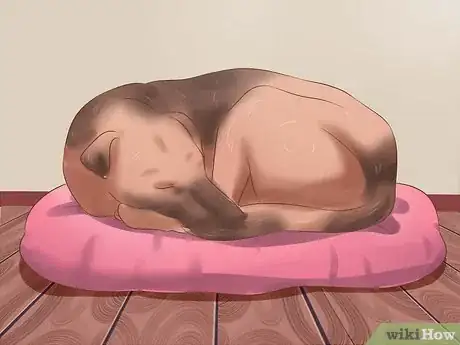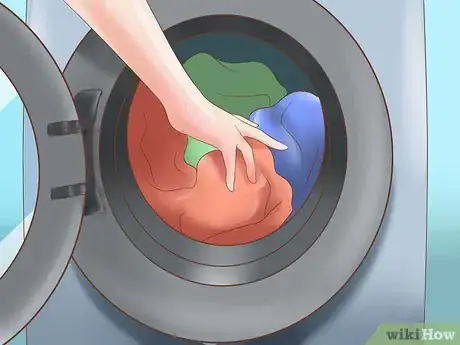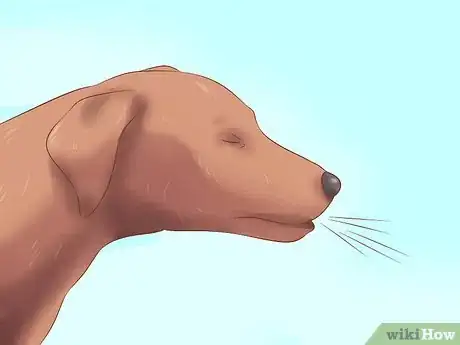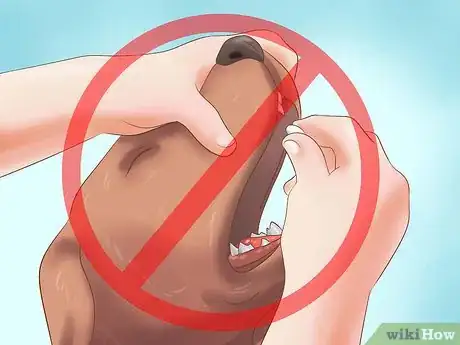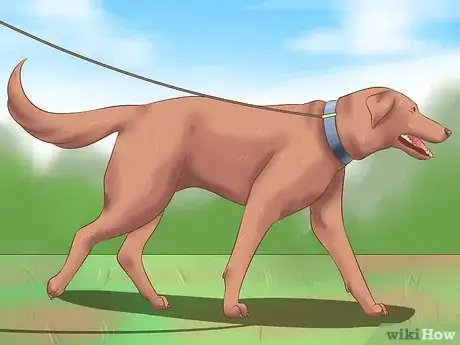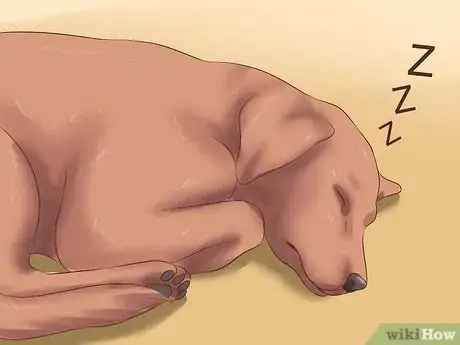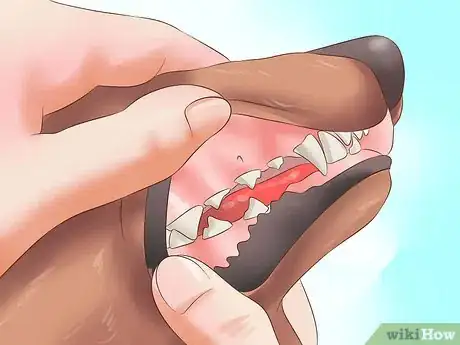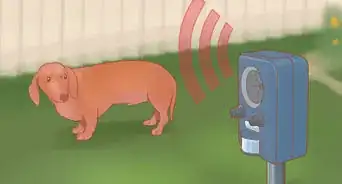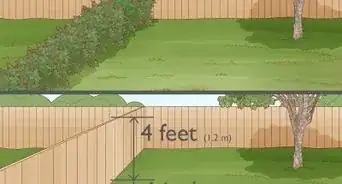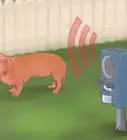This article was co-authored by Indigo Will. Indigo Will is a Canine Expert, Trainer, and Founder and Owner of K9-INDIGO® Holistic Dog Training LLC™, a dog training service in Los Angeles, California. Indigo specializes in understanding canine temperament and dispositions to allow canines to reach their full potential. He has studied various methods of training and philosophies to develop a unique, innovative, and result-driven method for canine behavior training.
There are 11 references cited in this article, which can be found at the bottom of the page.
This article has been viewed 111,667 times.
There are many different factors that can contribute to a dog's snoring, from the positioning of the head to the breed of the animal. Because there are so many factors that can cause snoring, there are also many solutions to help manage your pet's snoring, too. Read on to learn specific strategies that can help stop your dog's snoring, as well as advice to help you treat the cause of the issue.
Steps
Stopping the Snoring
-
1Adjust the dog's position. Move your sleeping dog so it is lying on its belly with its head and paws straight. If your dog insists on sleeping on its side, put a pillow under its head so its neck is straight. This may increase air flow.
- A round bed may encourage a curled position, which should also help.[1]
-
2Clean the bedding. Wash the bedding once or twice a week to clear away dust and other allergens. Vacuum carpet and curtains regularly.[2]Advertisement
-
3Add moisture to the air. Dry air can irritate the nose and throat and increase the amount or severity of snoring. If you live in an arid climate, run a humidifier in the room where your dog sleeps. Alternatively, increase the humidity by hanging damp laundry to dry, or leaving open containers of water in the room, with plenty of surface area.
-
4Minimize allergens. Keep your dog and your dog's bedding away from sources of smoke and dust. If the dog frequently sneezes or has a stuffy nose, try walking it on routes away from heavy traffic. Track pollen count in your area online or in the newspaper, and avoid morning walks on days when the pollen count is high.
- Pollen count is usually highest from 5am to 10am, and at its lowest in the early afternoon.[3]
-
5Be cautious about other treatments. Veterinary, scientist, and government organizations discourage the use of homeopathic treatments instead of vet-recommended treatments.[4] More concentrated, herbal treatments should not be used on your dog without a vet's advice, especially if the treatment is designed for humans. Dogs can react badly to substances that are harmless to humans.
Treating the Cause
-
1Exercise overweight dogs. Fat buildup around the throat area can constrict airflow and cause snoring. This is one of the most common causes of snoring, especially if it increased as the dog aged, or if the dog stops breathing for a few seconds, then gasps.[5] Make sure your dog gets enough exercise for its age and breed:[6]
- Young or young adult dogs of active breeds (such as retrievers or Jack Russell terriers) need at least 30–60 minutes of active exercise every day.
- Even "indoor" breeds and toy breeds need regular exercise beyond a short walk. Play an indoor game long enough to tire them out.
- Even old dogs should be walked daily, but not to the point of limping or exhaustion.
- Playing at the dog park is usually better for the dog than sustained jogging or running. For best results, look up recommendations for your dog's breed.
-
2Take short-nosed dogs to a vet. Dog breeds with short noses often have breathing problems that can cause snoring. Even if your dog has been this way its whole life, this can still be a serious health problem.[7] If your dog has any of these breeds in its ancestry, take it to a vet.
- Common short-nosed dog breeds include bulldogs, Boston terriers, pugs, boxers, chihuahuas, Pekingese, Shar Pei, and shih tzus. If you're not sure about your dog's breed, search for the breed name and "brachycephalic syndrome."
- The vet may recommend surgery to fix more serious problems, such as gagging or choking.[8] In one study, 74% of dogs who underwent surgery still snored, but more serious symptoms typically improved.[9]
-
3Watch for signs of infection. If your dog recently started snoring, it may have a cold, or allergies to spring pollen. This is especially true if the dog is sneezing, or dribbling liquid from its nose. Visit a vet if the symptoms don't go away within a few days, or if the nasal discharge becomes bloody or full of mucus.[10]
-
4Check the dog's teeth. An untreated tooth infection can lead to an abscess that limits air flow.[11] Check the dog's mouth for loose teeth, inflamed gums, blood, or lumps on gums or under the tongue.[12] Take the dog to a vet if you notice any of these problems.
- Even if you don't see these problems, keep the dog's teeth clean with a doggie toothbrush and chew toys.
-
5Visit a veterinarian. If you still aren't sure what's causing the snoring, visit the vet. Fungal infections, tumors, or other health problems take a professional to detect. The snoring may not be a sign of anything serious, but you don't want to take that risk.
Expert Q&A
-
QuestionCan I give my dog something to reduce snoring?
 Indigo WillIndigo Will is a Canine Expert, Trainer, and Founder and Owner of K9-INDIGO® Holistic Dog Training LLC™, a dog training service in Los Angeles, California. Indigo specializes in understanding canine temperament and dispositions to allow canines to reach their full potential. He has studied various methods of training and philosophies to develop a unique, innovative, and result-driven method for canine behavior training.
Indigo WillIndigo Will is a Canine Expert, Trainer, and Founder and Owner of K9-INDIGO® Holistic Dog Training LLC™, a dog training service in Los Angeles, California. Indigo specializes in understanding canine temperament and dispositions to allow canines to reach their full potential. He has studied various methods of training and philosophies to develop a unique, innovative, and result-driven method for canine behavior training.
Professional Canine Expert Not really. The body creates that snoring sound so they can get more air, and I don't really recommend trying to stop snoring. That said, if your dog's snoring has increased, you should probably check in with your vet to see if there's anything going on with the function of the breathing.
Not really. The body creates that snoring sound so they can get more air, and I don't really recommend trying to stop snoring. That said, if your dog's snoring has increased, you should probably check in with your vet to see if there's anything going on with the function of the breathing. -
QuestionWhat makes my dog make a noise blowing in and outward of its nose as if its pallet itches?
 Community AnswerThat usually just means it has a runny nose or that it’s hot. Sometimes, a dog may even do it for attention.
Community AnswerThat usually just means it has a runny nose or that it’s hot. Sometimes, a dog may even do it for attention. -
QuestionMy dog is overweight but always thinks she is starving. How can I help her to reduce her weight?
 Community AnswerOnly feed her what your dog food bag recommends, no more. Walk her in the morning and at night for at least 20 minutes. That should help. If her weight doesn't decrease after 2 weeks, take her to the vet. You may also want to be sure the dog is wormed.
Community AnswerOnly feed her what your dog food bag recommends, no more. Walk her in the morning and at night for at least 20 minutes. That should help. If her weight doesn't decrease after 2 weeks, take her to the vet. You may also want to be sure the dog is wormed.
Expert Interview

Thanks for reading our article! If you'd like to learn more about dog behavior, check out our in-depth interview with Indigo Will.
References
- ↑ http://www.petsadviser.com/behaviors/why-does-my-dog-snore-when-he-sleeps/
- ↑ http://www.petsadviser.com/behaviors/why-does-my-dog-snore-when-he-sleeps/
- ↑ http://www.pollen.com/allergy-prevention.asp
- ↑ https://www.avma.org/About/Governance/Documents/2014W_2013W_Resolution3_Attch1.pdf
- ↑ http://www.pets4homes.co.uk/pet-advice/dogs-and-snoring-is-it-cause-for-concern.html
- ↑ http://dogtime.com/exercise-needs.html
- ↑ http://www.thedogdaily.com/health/illness/dog_snoring_health/#axzz3Vjps5F1G
- ↑ http://www.vcahospitals.com/main/pet-health-information/article/animal-health/brachycephalic-airway-syndrome-in-dogs/2143
- ↑ http://www.ncbi.nlm.nih.gov/pubmed/16512847
- ↑ http://www.thedogdaily.com/health/illness/dog_snoring_health/
- ↑ http://www.thedogdaily.com/health/illness/dog_snoring_health/#axzz3Vjps5F1G
- ↑ https://www.aspca.org/pet-care/dog-care/ten-steps-your-dogs-dental-health
- ↑ http://www.petsadviser.com/behaviors/why-does-my-dog-snore-when-he-sleeps/
- ↑ https://www.aspca.org/pet-care/virtual-pet-behaviorist/dog-behavior/walking-equipment-your-dog
About This Article
To stop a dog from snoring, try adjusting the dog's position so that it's lying on its belly with its head and paws straight. You can also put a pillow under its head to straighten its neck and increase air flow. Allergens may be causing the snoring, so be sure to wash the dog's bedding 1-2 times per week and vacuum your carpets regularly. It also helps to keep your dog and its bedding away from sources of smoke and dust! If the snoring continues or gets worse, take your dog to the vet for a checkup. To find about more on how a humidifier can help, read on!
